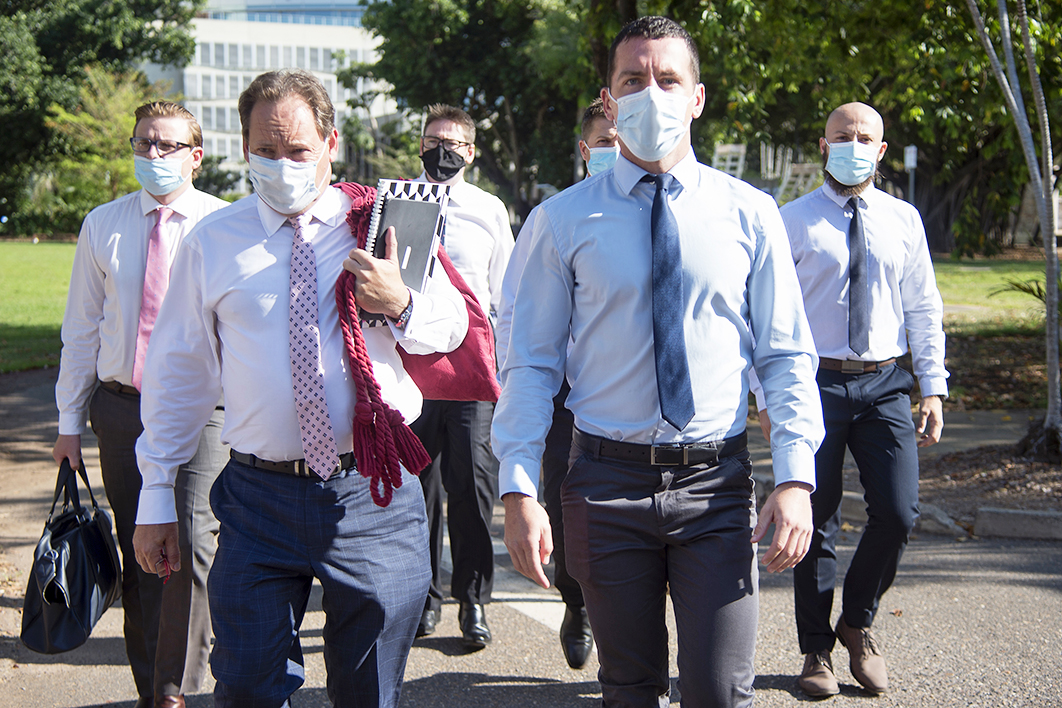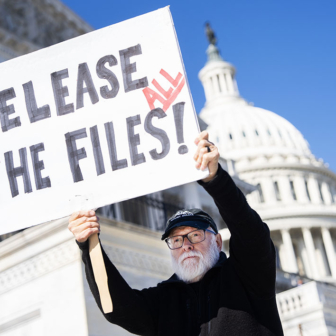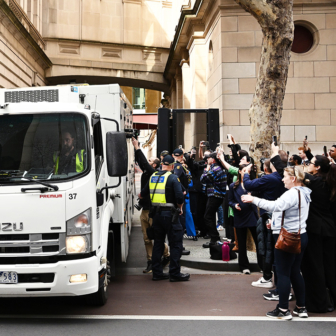“Is Zach Rolfe… Derek Chauvin?” That question won’t be voiced at the upcoming murder trial of NT police officer Rolfe, but it will be on many minds.
Two years ago, Rolfe was a serving constable based in Darwin. When he was named as the man who shot Kumanjayi Walker in Yuendumu in November 2019, no one had yet heard of Minneapolis police officer Chauvin or the man he killed, George Floyd. That changed six months later when harrowing smartphone footage of Chauvin’s knee on Floyd’s neck became 2020’s second-biggest news story. The reignited Black Lives Matter movement, linking America’s history of enslavement to contemporary cross-racial policing, readily translated to Australia’s history of invasion and Indigenous deaths in custody.
The resemblance between the Chauvin and Rolfe cases is more than skin-deep. Walker and Floyd each died after being arrested; both suffered their injuries on the ground with a police officer on top of them. Chauvin and Rolfe each argued that their use of force was reasonable; both were nevertheless charged with murder four days after the killings.
Each of the police officers was also charged during community unrest, although the American upheaval was far broader. That is why it was Floyd’s death, not Walker’s, that prompted street protests across Australia’s cities about the lack of progress since 1991’s royal commission into Aboriginal deaths in custody. A longstanding grievance — the lack of prosecutions of officials in relation to any of the hundreds of such deaths over the next three decades — had by then been partly remedied by Rolfe’s charge and an unrelated Western Australian prosecution in early 2020.
But Australian justice is quieter than America’s. Across 2020, every aspect of Chauvin’s life, from his marriage to his disciplinary record to his side hustles, was exhaustively pored over by the US media, as was every decision by his lawyers, prosecutors and judge. Rolfe’s case, by contrast, lacked not just an emblematic video but also any public airing of the evidence, thanks partly to Australian concerns about prejudicing juries.
What we do know suggests that Rolfe’s trial will be very different from Chauvin’s. Despite America’s greater penchant for armed confrontations, it was the encounter between Rolfe and Walker that involved weapons. Walker’s tool, a pair of scissors, was prosaic, but he was the first to draw blood, reportedly stabbing Rolfe in the shoulder. Rolfe responded not with his knee but with his gun. The gun and scissors explain why Rolfe’s prosecutors, unlike Chauvin’s, claim that he killed intentionally and why Rolfe’s lawyers, unlike Chauvin’s, claim that he killed defensively.
Australian justice is also slower than America’s. Even though Floyd died six months after Walker, Chauvin was convicted of his murder up to twelve months before Rolfe’s trial is now likely to begin. The delays were initially because of Australia’s different pre-trial processes and the Territory’s smaller justice system, combined with the pandemic’s barriers to travel. But then a new problem arose, in the form of yet-to-be-resolved questions about whether and how the Territory’s criminal law applies to police officers.
“Is Zach Rolfe… Di Fingleton?” That question was voiced soon after Rolfe was charged, but it still lacks a definitive answer.
Two decades ago, Fingleton was Queensland’s first female chief magistrate. Then she fell into a fight that was as trivial as Rolfe and Walker’s was tragic. Irritated by the activism of the Magistrates’ Association, a union of sorts for the judicial officers in her court, she wrote an angry letter saying that she had lost confidence in the body’s vice-president and telling him to show cause why he should keep his position as a coordinating magistrate.
Fatefully, her list of grievances included an affidavit the vice-president had given to a panel of judges reviewing an internal workplace dispute, in which he accused Fingleton and her predecessor of mismanaging transfers of magistrates around Queensland. A cascade of overreactions followed: the vice-president referred Fingleton to the state’s corruption commission, the state’s prosecutors charged her with a newly enacted offence of “retaliation” against a witness, and a jury rejected her defence that the letter was reasonable. Queensland’s Court of Appeal upheld that verdict and ruled that six months in protective custody would suffice to punish her.
The link to Rolfe’s case is a legal issue only belatedly recognised when Fingleton made a last-ditch appeal to the High Court of Australia. The national court was the first to notice that, three years before Fingleton wrote her letter, Queensland’s parliament had granted all of the state’s magistrates immunity from criminal prosecution for everything they did at work. Queensland’s chief prosecutor gamely argued that the immunity should not be read literally, but the High Court unanimously disagreed. With her prison stay long completed and her career ruined, Fingleton was belatedly exonerated.
In contrast to judges like Fingleton, police officers like Rolfe are usually given a much more limited protection against being sued for money for things they do at work. But Rolfe’s lawyers were quick to recognise that this had changed in Rolfe’s case just eight months before Walker was shot. A new law enacted by the NT Legislative Assembly stated that the Territory’s cops are not “criminally liable” for anything they do “in good faith” as part of their functions or powers.
Rolfe’s accusers seem to have taken a while to reckon with this obstacle. They knew that they could argue that Rolfe hadn’t acted defensively — that his first shot was a proportionate response to Walker’s scissors but his second and third, the fatal ones, were not. They also had a response to Rolfe’s claim that he acted “reasonably” — a defence the Territory’s criminal code provides officers who injure people as part of their duties — in the form of an expert report criticising several aspects of Walker’s arrest.
Although Chauvin’s prosecutors readily won on similar arguments in Minnesota, Rolfe’s prosecutors knew they faced a tougher challenge. Floyd was killed as he lay on the ground during an arrest for petty counterfeiting, but Walker was arrested for allegedly attacking police with an axe, and was shot while wielding scissors. In contrast to Floyd’s nine minutes under Chauvin’s knee, just three seconds passed between Rolfe’s lawful first and contentious last shots, leaving little scope to argue that the latter were fired in bad faith.
Rolfe’s prosecutor, Philip Strickland, needed to argue that the Territory’s immunity provision didn’t apply at all to Rolfe’s second and third shots. He relied on court rulings that immunities from criminal prosecution should be read not literally but narrowly, and in a way that sits well with other laws. His eventual stance was that Rolfe’s second and third shots weren’t immune because they came after his failed attempt to arrest Walker and were already covered by other (less generous) defences in the Territory’s criminal law.
The upshot is that the question of Rolfe’s guilt or innocence, like Fingleton’s, turns at least as much on how judges read a complex statute as on how jurors decide on the facts. The good news in Rolfe’s case is that the problem was recognised before — rather than long after — his trial. The bad news is that the attempt to resolve it came too close to his trial to do it justice.
“Is Zach Rolfe… John Elliott?” That question was voiced just days before Rolfe’s jury was to be chosen, but will not be answered for months.
Two generations ago, Elliott embarked on a series of corporate acquisitions that made him a major figure in Australia, including as national president of the Liberal Party and president of the Carlton Football Club. But his mid-eighties “white knight” actions against a hostile takeover of BHP prompted an investigation by the National Crime Authority and, eventually, mid-nineties fraud charges.
High-profile white-collar prosecutions are always difficult, particularly when they rest on evidence turned up by a novel body like the NCA. And so it proved in Elliott’s case. Trial judge Frank Vincent spent months resolving multiple procedural and statutory disputes before he ultimately concluded that the NCA had overstepped its bounds and most of the evidence it gathered could not be used against Elliott.
Elliott’s prosecutors immediately raced to the High Court, arguing that Vincent’s ruling was wrong and an injustice was imminent, but the national court said that it wouldn’t hear a challenge ahead of Elliott’s jury trial. Australian law, the judges explained, leaves legal questions in the hands of whichever judge is in charge of the trial and only allows those rulings to be reviewed after the trial is done and dusted. Any other system, they explained, would slow down the trial system too much, to everyone’s detriment.
Twenty-five years later, the task of resolving the question of Rolfe’s partial immunity from prosecution was in the hands of a very experienced trial judge, Dean Mildren. Following standard practice, he planned to resolve legal questions about Rolfe’s prosecution in a closed session just before the trial was due to start. But possibly realising how crucial the immunity question was, he took advantage of a pandemic-induced delay in the trial to send the dispute to a bench of all five Territory judges.
A week before Rolfe’s delayed hearing was scheduled to start, the five judges ruled: Rolfe’s jury must be told to acquit him of all charges if he fired his final two shots “in good faith.” The disappointed Strickland immediately asked for the trial to be further delayed to allow him to seek a review in the High Court, but Mildren refused, citing the High Court’s stance in Elliott’s case.
Mildren and Strickland would have been all too aware of how the Elliott case ultimately played out in the 1990s. After the High Court refused to intervene before Elliott’s trial, his prosecution collapsed without a jury being sworn in. The wounded prosecutors then sought a belated review of Vincent’s rulings on the NCA and won on every point, in both Victoria’s appeal court and the High Court. But Elliott could no longer be tried for fraud because he had been acquitted, albeit (now) with an asterisk.
Strickland faced a very narrow path to successfully prosecuting Constable Rolfe for Walker’s death. He would have to convince the High Court to abandon its earlier stance on pre-trial reviews. He also needed to convince the justices that five Territory judges’ unanimous view of Rolfe’s immunity was both important and doubtful enough to be worth the national court’s time. Then he would have to convince the same court to rule that Rolfe’s second and third shots were not covered by the “good faith” immunity. And, after all that, he needed to convince Rolfe’s jury that the police officer shot Walker both excessively and unreasonably.
But first he faced a more immediate problem: it was Thursday, and Rolfe’s jury would be selected the following Monday.
So, “Is Zach Rolfe… Derek Chauvin?” This question still hasn’t been — and won’t ever be — voiced in court, but Justice Jacqueline Gleeson came close last month.
Two working days before Rolfe’s murder trial was due to kick off, Mildren and Strickland discussed some contingencies that would arise if the High Court decided to get involved. Everyone accepted that the national court probably couldn’t settle whether Rolfe’s second and third shots were subject to immunity in time for the trial to go ahead as planned. But Mildren figured there was time for the national court to at least to decide whether or not it would take on the case.
Such decisions only require two justices and can be made after thirty or so minutes of argument, or even without a hearing. While the High Court usually takes months to schedule a hearing, it can act much faster if a case is urgent enough. During 1998’s waterfront dispute, it responded to a hasty application on a Thursday by Patrick Stevedores to pause a pro-union ruling made by the Federal Court by ordering a hearing before all seven judges the following Monday. So, Mildren pencilled in Tuesday for a possible late start to Rolfe’s trial if the High Court speedily decided it wouldn’t get involved.
It wasn’t to be. When Strickland and Rolfe’s counsel zoomed in the next morning, the duty judge, Justice Gleeson, told them that the High Court would take three weeks to decide whether it would even take on Rolfe’s case. After both lawyers politely said that they would clear their diaries for a thirty-minute hearing in the middle of the next month, Gleeson asked them whether Rolfe’s murder trial should go on as scheduled anyway.
The High Court’s newest judge took up her role in March this year after the retirement of Virginia Bell, a former defence lawyer and experienced criminal appeal judge. Gleeson’s appointment from the NSW registry of the Federal Court preserved the geographical and gender balance of the court, but left the national court without any criminal law specialists for the first time in its twelve-decade history. Her apparent notion that a murder trial could run for weeks before the High Court decides whether to get involved may be an example of that gap in the national court’s expertise.
The lawyers before Gleeson seemed baffled by her approach. Rolfe’s lawyer, the national bar’s most starred figure, Bret Walker, allowed that lawyers running a murder trial might be “distracted” by an imminent High Court intervention. Strickland was less polite: a mid-trial hearing would be “inutile” — pointless — because the trial itself would already have been following the Territory ruling. He mused that maybe the court could act a bit quicker, but Gleeson ignored the hint, pronounced herself disturbed by Strickland’s stance and told him to put it in writing. He did. Either the trial or the High Court hearing could happen as scheduled, but not both.
That left Gleeson with a choice to make and she spent the weekend mulling it over. The following Monday, she ruled that, despite many changes to the legal landscape since the 1990s, the law on pre-trial High Court rulings set out in Elliott’s case hadn’t changed. But the facts had:
The injustice of a possible acquittal of a police officer for murder of a young man in the context of the attempted execution of an arrest warrant, on the basis of an incorrect ruling on a question of law, is of a different order of magnitude from an acquittal on a charge of white-collar crime, however egregious.
In short, John Elliott wasn’t Derek Chauvin. Or, at least, Rolfe’s trial must wait until the High Court dispels at least one, and maybe all, of the elephants in Mildren’s courtroom.
So, who is Zach Rolfe? This morning, three weeks after Rolfe’s trial was supposed to start, the High Court finally decided that Zach Rolfe is… George Pell! That is, it decided, as it did in the last high-profile criminal case to reach the national court, that the very decision on whether or not to take on the case at all is one that needs the attention of all seven of its judges.
Today’s decision means that the national court will rule on the law, in particular whether or not Rolfe is John Elliott or Di Fingleton or neither, before a jury decides — if it ever does — whether Rolfe is Derek Chauvin. Rolfe, and everyone else, must likely wait until next year to learn each of these answers, including whether or not the last one will come with an asterisk. •




